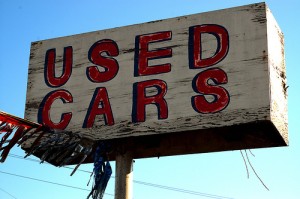A little over three years ago when Tony and I moved from Indiana to North Carolina, we had to make a tough decision about our cars. At the time, we were both driving old cars with 100,000+ miles on them. Both cars had recently had some issues. My car needed about $600 in work that I’d been putting off.
We had to make a choice: buy a used car, buy a new car, or keep both of our old cars and hope that they’d keep running. We were really nervous to buy a used car with a payment. We didn’t like the idea of making a payment on a car that frequently needed to go to the shop. Because we were sharing a single car, any car problems would have left both of us without a vehicle. We were afraid to risk buying a used car when we were moving 800 miles away from all of our friends and family.
In the end, we made the decision to buy a brand new car — a Hyundai. The 100,000-mile, 10-year warranty and 5 years of roadside assistance sold us. We knew if something major went wrong with our car, we wouldn’t be stranded, and we wouldn’t have to come up with the money to fix it.
Of course, we made this decision before we had an emergency fund saved. If I had to make the decision again, I’d say it’s smarter to have enough money saved to cover repairs instead of counting on a warranty. But the car has served us well, it’s been very nice not having to worry about anything but basic maintenance since the car is new, and we’ve had it for almost 3 years with no issues other than a replaced battery and a few tires. It was also very reasonably priced, so I have no regrets.
It seems now we’re facing our first non-maintenance repair. Today on my way home from an appointment with my midwife, the vents stopped blowing air. My first instinct was to check the fuse. I went to a parts store to buy a new fuse, and one of the customer service representatives was nice enough to bring a fuse checker out to my car to confirm that the fuse was in fact blown before I purchased replacements. The fuse was fine. His hunch? Our blower motor was out.
I called my dad (a former mechanic), and he confirmed it: if the blowers aren’t working and the fuse isn’t blown, the blower motor likely needs to be replaced.
This wasn’t the news I wanted to hear. Thankfully, we have an emergency fund, so coming up with the money wasn’t an issue. But we’ve been working hard to replenish our emergency fund after a summer with no income. The last thing I wanted to do was pull a bunch of money out of our savings for car repairs.
Then I remembered: we bought the car because of its supposedly awesome warranty — a warranty that we haven’t yet used because items like tires and batteries are not included in the coverage. I thought to myself, “I bet this part isn’t covered either. Wouldn’t that be just my luck?”
A quick call to the Hyundai dealership proved otherwise. If the problem is the blower motor, the repair will be covered. We have an appointment tomorrow to have it checked out and hopefully get it fixed.
I was hoping they’d supply a loaner vehicle as part of our warranty as well, but no. If it’s going to take longer than a day to fix, we’ll have to borrow a loaner car at a rate of $10 a day. Hopefully we won’t have to do that, but if we do, $10 a day is less than we’d pay at a car rental place, so it’s better than nothing.
If you’re driving a car purchased new in the past 5 (or even 10) years, don’t get anything fixed without calling the dealership first. You may be surprised to discover that your warranty covers the repair.
The other moral of the story? Don’t buy a new car unless you intend to drive it for a long time. These days it’s common to buy a new car every 3 years. Because warranties are non-transferable, any warranty is void after the car is sold. Because new cars are unlikely to have problems for the first 50,000-75,000 miles, you’ll never get to take advantage of new car warranties if you get rid of the car too soon.
We plan to keep this car for at least 10 years so we can get the most for our money and avoid another car payment once it’s paid off.
